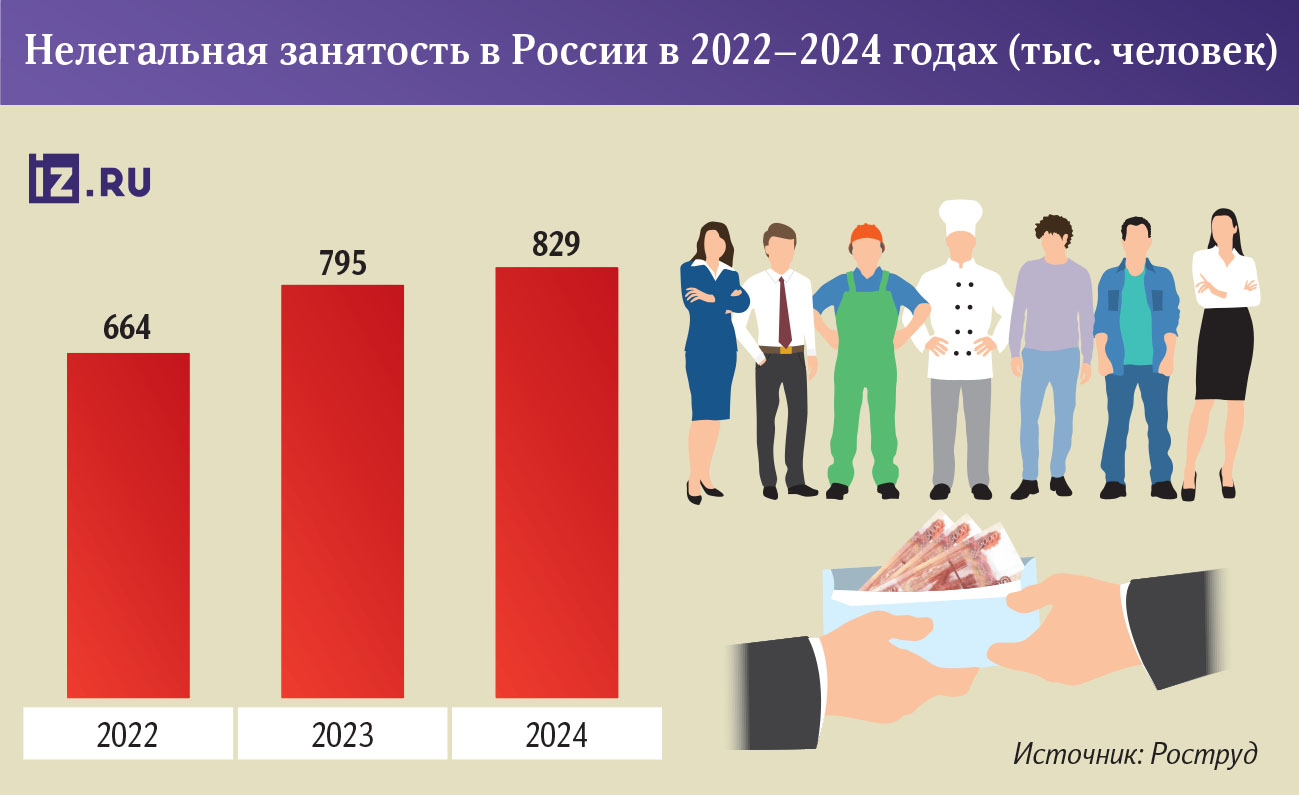- Статьи
- Economy
- Worker in the shadows: more than 800 thousand workers have been identified in the Russian Federation.
Worker in the shadows: more than 800 thousand workers have been identified in the Russian Federation.

Last year, more than 800,000 people were identified in Russia who work in violation of labor laws, Rostrud told Izvestia. In particular, such employees receive salaries in envelopes. However, in fact, the problem is broader — more Russians may be employed with disabilities, but not all of them can be identified. In the case of gray salaries, people can receive about a third more, since the company does not pay taxes for them. At the same time, the fines for this are insignificant for employers — administrative and tax liability, and only in extreme cases criminal. What the authorities are doing to reduce illegal employment, and whether it will be possible to do so, is in the Izvestia article.
How many people in Russia work illegally
The number of detected cases of illegal hiring of workers increased by almost 5% over the year, from 795,000 in 2023 to 828,000 last year. Such data was shared with Izvestia in Rostrud.
Employment can include work without an employment contract, without a license in the service sector, payment of wages in whole or in part in an envelope, and informal part-time work. We are not talking here about illegal migrants who work in our country without permits, but about violations of the procedure for registering labor relations with Russians.
Their signs may be if the employer pays more than 10 of its employees a salary below the minimum wage (minimum wage, from January 1, 22,440 rubles). Or, for example, if an organization enters into a contract with more than 10 self-employed people, and their average monthly income exceeds 20 thousand rubles. And also if the average monthly salary of an employee differs by more than 35% from the industry average in the region.
In just three years, over 2.2 million informally employed people have been identified in Russia — almost all of them have managed to legalize labor relations, Rostrud said. This can be done by entering into an employment relationship, registering self-employment or individual entrepreneurship, as well as cooperation with an employer under civil law contracts.
However, the problem is broader: although the figure of 800,000 people seems large, this number is not so large nationwide — about 1% of the total workforce in the country. In fact, there may be many more informally employed people. According to Rosstat, 76.2 million people were employed in the Russian economy at the end of 2024.
What are the risks of a salary in an envelope?
In conditions of personnel shortage, companies often resort to informal employment in order to "close" vacancies faster. In addition, many people believe that it is more profitable to work without official registration, because due to tax deductions, a smaller amount is received. It often happens that workers officially settle in one place and earn extra money in another.
In addition, in recent years, many pensioners have resorted to illegal employment — from 2016 to 2024, the pension of working pensioners was not indexed, added Olga Belenkaya, head of the Macroeconomic Analysis Department at Finam. This problem has been resolved since 2025: now the increase in pensions affects all pensioners, including working people.
Working in earnest can be more beneficial to the employer, Olga Belenkaya believes. The expert added: Thus, he "saves" not only the personal income tax (13% personal income tax), which is withheld from the employee, but also all deductions to extra—budgetary funds (over 30%) - this amounts to about 40%. And the employee himself may be offered a higher salary.
At the same time, it is the working citizen himself who suffers the most from the salaries in the envelope. A person is practically not protected in a relationship with an employer, he can easily be fired. He also cannot count on social guarantees — vacation, sick leave, decent maternity leave and a pension, Olga Belenkaya reminded.
Nevertheless, external conditions — high inflation, the weakening of the ruble — lead to the fact that citizens are willing to sacrifice their rights by working illegally, Natalia Milchakova from Freedom Finance Global is sure.
How to combat illegal employment in Russia
Responsibility for the salary in the envelope, if such cases are identified, is mainly borne by the employer. Within the framework of tax legislation, the organization will have to make additional charges and pay a fine of 20% of the unpaid amount. In addition, there is a risk of being held accountable for violating the Labor Code — this will entail the imposition of an administrative fine (from 50 thousand rubles to 100 thousand rubles). If the failure to pay contributions is particularly large, the employer faces criminal liability.
The authorities are fighting illegal employment year after year. In particular, in 2022, interdepartmental commissions were established to combat illegal employment in the regions. They include representatives of the Prosecutor's Office, the Ministry of Internal Affairs, the Federal Tax Service and Rostrud. The commission itself cannot be held accountable, but it transmits information to the State Labor Inspectorate and tax authorities for further inspections, which may result in prosecution.
And since this year, the Rostrud register of unscrupulous employers has been launched in Russia. Companies that violate the law when employing employees are listed there. As the press service of the Ministry of Labor explained to Izvestia, the register is a tool for preventing illegal employment. As of March 14, there are 31 employers in the register, including 30 individual entrepreneurs.
— In addition, in 2025, the moratorium on Rostrud conducting business inspections has been extended. Scheduled inspections are carried out only in relation to companies with a high level of risk, while unscheduled inspections are carried out only in coordination with the prosecutor's office — upon receipt of appeals from citizens or activation of risk indicators that signal possible violations, the press service of the department added.

Now many organizations agree to come out of the shadows, because they understand that with legal registration it is more profitable to work and pay taxes than to have problems with the law later, Natalia Milchakova from Freedom Finance Global is sure. On the other hand, attempts to avoid taxes will remain for the time being. Employees, provided they are well paid, will be willing to continue working illegally, unwilling to break the chain that binds them to a gray employer.
Переведено сервисом «Яндекс Переводчик»







